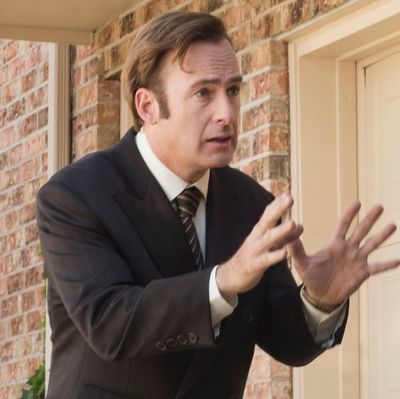
Will Gilligan et al. ever break their addiction to the flash-forward and flashback? Barely an episode of Breaking Bad — and now its spinoff — started out anywhere other than the future or the past. From a writer’s perspective, the device is understandably alluring: What else could hook a viewer so immediately as getting a glimpse into where a character once was, or where they will ultimately end up?
Here, we start with the past: Jimmy McGill, younger, swaggering, visibly long hair, led out of a jail cell in shackles to the counsel of Brother Chuck. Apparently Jimmy has not only gotten into some proverbial shit, but that shit has led him all the way from small-town Illinois to Albuquerque, a town Jimmy only knows as (1) Impossible to spell, and (2) Where Bugs Bunny should’ve taken a left turn. Two recaps ago, I suggested that the show’s challenge would be turning a cardboard cutout into a human being. Now we’re starting to feel the bumps.
One of the episode’s most intimate scenes — and really, one of the most intimate moments we’ve ever had with Jimmy or Saul or whatever we want to call him now — comes early, in the nail salon, in the middle of the night, on the phone with a woman from the slick law firm referenced in episode one. Jimmy obviously knows her and she knows him; they talk with the amused skepticism of ex-lovers. Jimmy tells her — and let’s call her by her name, which we find out is Kim—that the Kettlemans, the family targeted for that embezzlement charge, are in danger. Kim wants to know if Jimmy is drunk. He says he’s not. It’s the least consequential lie he tells all episode.
What ensues is basically a series of scenelets in which Jimmy’s ethical mettle is tested. We see him warning the Kettlemans of imminent danger from a pay phone; we see him outside the Kettlemans’ house, talking with Kim and the guy with the most aggressively styled bangs from the slick law firm about the Kettlemans’ subsequent disappearance; we see him calling Tuco’s associate from a pay phone, begging to know where the Kettlemans have gone. Basically, we see him becoming a criminal by trying to make an irrevocably wrong situation right.
Given how deep we know Jimmy’s cynicism runs in the future, it’s an interesting setup: His future as Saul suddenly seems to be only part-choice, with plenty of accident and circumstance thrown in. Walter White chose Heisenberg; Jimmy is on track to becoming Saul whether he realizes it or not.
Back to Albuquerque, where we find out that Tuco’s associate — who we learn is named Nacho — has been detained for the Kettlemans’ disappearance. Whether he named Jimmy as his counsel or whether they just found Jimmy’s matchbook in Nacho’s pants pocket is unclear; what we do know is that Jimmy is hunted down for an answer. (Let me pause here to say that I like Nacho. In a show populated by some gratingly uptempo characters — Jimmy, the Skater Twins, Tuco — it feels good to be in the presence of someone who doesn’t seem like he’s going to catch on fire every time he opens his mouth.) Enter Mike Ehrmantrout, called in by local law at the courthouse to, well — the implication is that Mike is going to muscle answers out of Jimmy, fueled by some residual anger over their weird parking-garage feud. A stretch, but it brings the two characters a little closer together.
In any case, Mike doesn’t follow through primarily because he believes Jimmy’s theory that the Kettlemans haven’t been kidnapped or murdered but have voluntarily disappeared — an instance where we see Jimmy’s survivalist impulse to bullshit people elevated to the level of real probability. Once again, he survives on the strength of his only weapon: his mouth.
The crux of “Nacho” is a brief scene between Mike and Jimmy in the stairwell of the courthouse. Mike believes Jimmy’s theory because to him it makes sense: Prompted by Jimmy’s cryptic warning, the Kettlmans made their disappearance look like a kidnapping. Criminal minds think alike.
As the season’s plot starts picking up, I keep wondering if we’re going to get more specifics about Jimmy’s life in the straight world, particularly with regards to lawyering. In Breaking Bad, Saul’s world is fueled by stereotype and satire; here, the most we learn about being a public defender is that the pay is bad, the clients are hopeless, and the cases unsalvageable, which is what television shows always tell us about being a public defender. As much as I love the busted Suzuki Esteem and the office at the back of the nail salon, they’re ultimately cartoons against which the show will need to struggle in order to feel real.
To that point, the most convincing moments of the show so far have been ones in which Jimmy’s desperate thinking proves not only believable to the characters around him, but right. The plot rewards him: By virtue of acting crazy, he starts to look sane. So we end with a quiet, meditative scene in which Jimmy not only convinces the cops and the Kettlemans’ lawyers that the Kettlemans are probably hiding out somewhere, but he treks into the foothills behind the Kettlemans’ house to find them himself.
As an Arizonan, I can say that this is another aspect of the southwest that the show gets right: The strange, sometimes even uncanny way a subdivision or condo development will end abruptly in wilderness, separated only by a gate, maybe less — a contrast between the most banal forms of civilization and most severe forms of nature. Of course, Jimmy does find the family, camped out and singing car-trip songs with a kind of delirious fervor. Stuffed unceremoniously into their technical backpack: all that cash they’d promised they didn’t know anything about.

